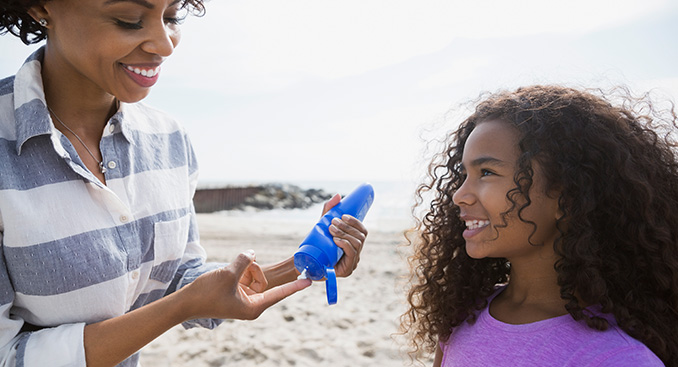How to Pick Healthy Summer Products for your Family

Warm summer days and long nights are when families get to swim, barbecue, camp, and just have fun outdoors. Unfortunately, it’s also when a sunburn or insect bite can put a damper on an outing.
It’s important to keep sunscreen and bug spray on kids, but some confusing information online about chemicals prevents parents from doing just that, said Andrea Rinderknecht, MD, a pediatrician with TriHealth’s Queen City Physicians.
She offered evidence-based tips for protecting kids.
Wear sunscreen with zinc oxide, and reapply
Dr. Rinderknecht echoed the American Academy of Pediatrics in suggesting a zinc oxide sunscreen, as it sits on skin and acts like mirrors that reflect the sun. Sunscreens that are not mineral-based, however, get absorbed, allowing some UV rays to penetrate the top layer of skin.
Oxybenzone, in particular, is a chemical used in some sunscreens that may be linked to hormonal changes, which is the main reason why pediatricians are cautioning against its use in kids, who absorb more chemicals through their skin than adults do. Additionally, even though their skin may absorb some chemicals from sunscreen, it’s better to use it if exposure to sunlight cannot be avoided.
Another benefit to zinc oxide is that it’s thought to be safer for coral reefs, since its it possesses fewer harmful chemicals that bleach coral reefs.
Once you’ve chosen your sunscreen, apply it 30 minutes before heading out, especially for wet activities, and reapply every two hours.
“A lot of people forget that sunlight reflects off water,” Dr. Rinderknecht said.
Additionally, SPF 50 is good enough, as there is no evidence that a higher SPF is more effective, according to the AAP.
“I would not spend extra money on anything higher than SPF 50 because you won’t get the incremental benefit,” Dr. Rinderknecht said.
Dress infants in protective clothing
The best sun protection for infants is physical barriers, such as sleeves and hats, and keeping them shaded. Additionally, even though their skin may absorb some chemicals from sunscreen, it’s better to use it.
“Any sunscreen is better than a sunburn,” Dr. Rinderknecht said. “It’s better to have sunscreen on a small portion of the body—like on hands and feet—than to not use it at all.”
Use insect repellents with DEET
When it comes to protecting your children, DEET is the only compound that’s proven to be effective against mosquitos.
“I understand that we don’t want to expose our kids to chemicals,” Dr. Rinderknecht said. “We also don’t want them to get West Nile virus or be up screaming all night because they’re itching all over.”
Some insect repellants contain 15 to 30 percent DEET, considered a safe concentration for kids. As for natural repellents, Consumer Reports found they “lasted just one hour or less against the Aedes aegypti mosquito—the kind that can spread Zika, yellow fever, dengue, and chikungunya.”
Watch for ticks
DEET also works against ticks, which Dr. Rinderknecht said have been showing up more frequently as of late. The best protection is full coverage clothing when you’re in a forest, she said.
“The way you get ticks is by brushing up against bushes and leaves where deer have walked by and dropped off a tick,” she said.
Keep an eye on yourself and your kids, as ticks like warm areas, such as the groin and hair, Rinderknecht said.
“Just because it’s a private area, don’t forget to check,” she said.
To remove a small tick, scrape it off with a credit card or fingernail, according to HealthyChildren.org. Cover a medium tick with a cotton ball soaked in dish soap for 30 seconds, then lift it away. Use tweezers for large ticks, grabbing the head and pulling straight up without twisting or crushing it, so you don’t leave the head.
Don’t try to burn ticks out
“We actually see more kids with burns from that technique than we do successful tick removal,” Dr. Rinderknecht said.
For your child’s sunburn or stubborn tick problem that you can’t solve alone, visit TriHealth for expert pediatric care.